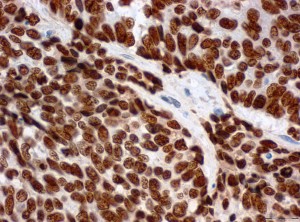
Tissue section of a cervical tumor. The cancer cells contain high levels of LEDGF protein (brown staining).
© Miriam Reuschenbach, Heidelberg University Hospital
Certain types of human papillomaviruses (HPV) cause cervical cancer by settling in a body cell and inducing it to divide in an out-of-control process. Scientists at the German Cancer Research Center (Deutsches Krebsforschungszentrum, DKFZ) have now discovered a mechanism by which HPV protects cancer cells from undergoing DNA damage and dying as a result of cancer therapies.
Chemotherapy drugs and irradiation damage the DNA of cancer cells. As a result, a process called programmed cell death is activated, and the cancer cells die. Human papillomaviruses (HPV) that have settled in cells of the cervix protect their hosts from this fate and thereby increase the cells’ resistance to cancer therapies. Scientists have suspected for a long time that two genes of the virus, E6 and E7, are involved in this process.
„In order to find out how HPV protects host cells against DNA damage, we blocked the activity of the E6 and E7 genes in HPV-positive tumor cells,“ says Jenny Leitz, first author of the publication. The result: In the absence of E6 and E7, cells mostly block the production of a protein called LEDGF, which normally protects cancer cells from DNA damage.
Do the two HPV genes activate the production of LEDGF? To pursue this question, the researchers inserted one or both of the viral genes into human skin cells. „Subsequently, levels of LEDGF rose significantly,“ says Professor Felix Hoppe-Seyler. „The effect was strongest when we introduced both genes into the cells.“
In tissue sections of HPV-positive cervical cancer and its precursors, the researchers also found higher levels of LEDGF than in healthy tissue. But does this also mean that higher LEDGF levels protect cancer cells from DNA damage? To find out, the scientists treated HPV-positive cervical cancer cells with DNA-damaging chemical substances or gamma radiation. „When we blocked LEDGF in the cancer cells, there was significantly more DNA damage and the cells divided less frequently,“ reports Hoppe-Seyler, who led the study. „Based on these experiments, we think that HPV activates the production of LEDGF through the E6 and E7 genes and thereby protects cancer cells from DNA damage.“
These findings may be useful in increasing the effectiveness of chemotherapy and radiotherapy when applied to tumors. „To accomplish this, we need to develop LEDGF inhibitors that target cancer cells,“ says Hoppe-Seyler. „But we still have a long road ahead of us to achieve this goal.“
First author Jenny Leitz is supported with a PhD grant from the Peter and Traudl Engelhorn Foundation.
From the German Cancer Research Center (DKFZ)
